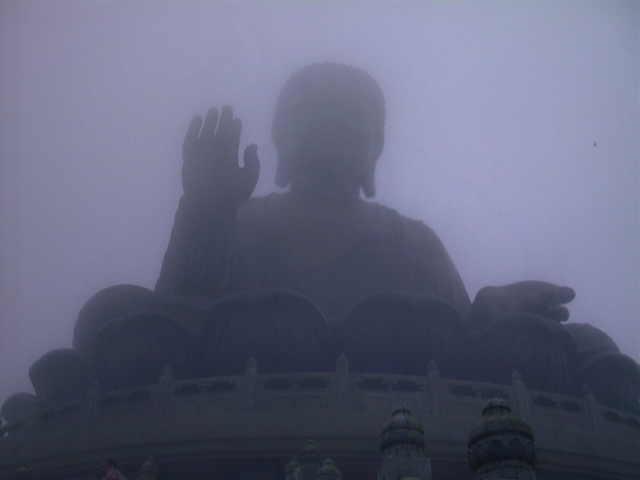

"...Bodhisattvas take on the suffering of all sentient beings, undertaking the journey to liberation not for their own good alone, but to help all others. And eventually, after the attainment of liberation, not dissolving into the Absolute or fleeing from Samsara, but choosing instead to return again and again to devote their wisdom and compassion to the service of the world."
THE FOUR BODHISATTVA VOWS
- However innumerable sentient beings are, I vow to influence those seekers who have planted the causes and conditions along the path in succeeding to achieve it.
- However inexhaustible the defilements are, I vow to contribute in extinguishing them.
- However immeasurable the dharmas are, I vow to master them.
- However unattainable the Way is, I vow to attain it.
BE AS IT MAY...
From The Diamond Cutter Sutra, Section III, The Real Teaching of the Great Way Buddha said:
Subhuti, all the Bodhisattva Heroes should discipline their thoughts as follows: All living creatures of whatever class, born from eggs, from wombs, from moisture, or by transformation, whether with form or without form, whether in a state of thinking or exempt from thought-neccessity, or wholly beyond all thought realms--all these are caused by Me to attain Unbounded Liberation Nirvana. Yet when vast, uncountable, immeasurable numbers of beings have thus been liberated, verily no being has been liberated. Why is this, Subhuti? It is because no Bodhisattva who is a real Bodhisattva cherishes the idea of an ego-entity, a personality, a being, or a separated individuality.
AND NOW THIS:
It should be brought to the attention of all those who may be so interested that the nature of Bodhi (Enlightenment) is attained in the same manner by both men and women. There are not even slight differences in this connection, neither in the method nor in the quality of attainment. The Buddha discovered that gender is of no importance for the aim of freedom. For example, a female saint at the level of an Arahat or a female being striving after sainthood is in no way subordinate to a male saint or male follower of the Buddha or visa versa. It is not possible to declare a higher or more important equality of the sexes.
According to the teachings of the Buddha, there exists no practical difference between the sexes. Man and woman are equal in their dependence upon each other and in their clinging which must be overcome (Angutara-Nikaya I,1). Man and woman are equal in the rights and duties of their partnership, as the Buddha described it for lay followers in the famous sermon to Singalako (Digha-nikayaNo.31). Thus stated, for male or female, the Four Bodhisattva Vows, their importance, meaning, and execution, are the SAME in any and all cases.(source)
The Four Universal Bodhisattva Vows are translated from the original Pali and Sanskrit texts and when translated into english, open to interpretation. The meanings are basically the same, however the words used to convey those meanings end up in several forms. To compare some of those interpretations the following examples are offered for your review:
Example 1...... Example 2..... Example 3.
ADDITIONALLY:
Interestingly enough, in relation to the first vow "However innumerable sentient beings are, I vow to influence those seekers who have planted the causes and conditions along the path in succeeding to achieve it" the Sixth Patriarch of Zen, Hui-neng, refers to the twofold process of letting go of past misdeeds and guarding against future ones, tasks to be performed by ourselves alone. Our Original Nature is NOT the source of our problems but rather of their solution. "Repentance" described by the Sixth Patriarch in his writings does not require another to whom our appeal is directed, nor anyone from which forgiveness is received. Although it involves a vow for the deliverance of an infinite number of sentient beings, the vow is similarly explained as being self-directed:
It does not mean that I, Hui-neng am going to deliver them. And who are these sentient beings, potential within our minds? They are the delusive mind, the deceitful mind, the evil mind, and such like -- all these are sentient beings. Each of them has to be delivered by one-self by means of one's own Essence of Mind [Original Mind]; only by one's own deliverance, is it genuine.
The ultimate refuge, then, lies not beyond us, but rather in our Original Nature; each should take refuge in the Buddha within. No reference is made to any other Buddhas: "hence if we do not take refuge in the Buddha of our own Mind-essence, there is nowhere else for us to go." In this respect Hui-neng is in perfect accord with the teachings of Bodhidharma, the First Patriarch of Zen. (source)

According to the Principle of Impermanence, the existence of living beings is ever-changing. Some are born, some die. The absolute number at any given moment cannot be indentified, therefore it is regarded as being numberless.
 |
AWAKENING 101 Approved Site |
|
| |

